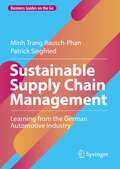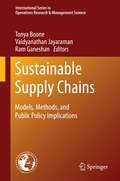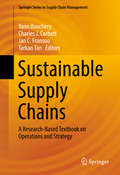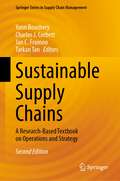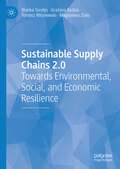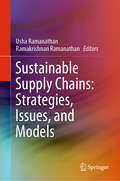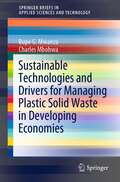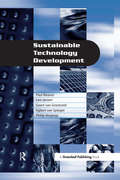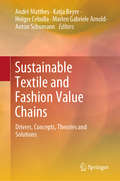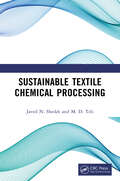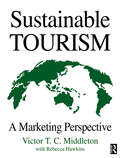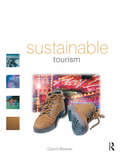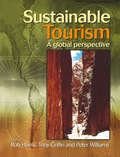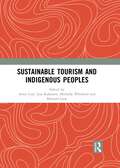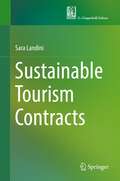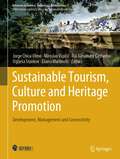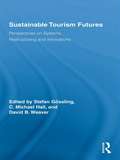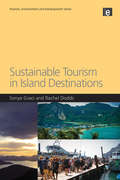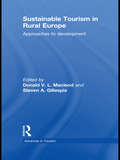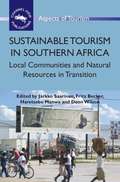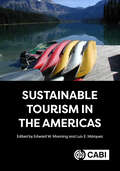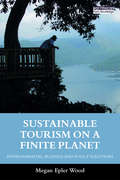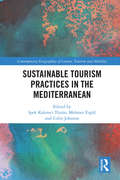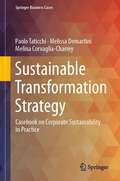- Table View
- List View
Sustainable Supply Chain Management: Learning from the German Automotive Industry (Business Guides on the Go)
by Patrick Siegfried Minh Trang Rausch-PhanThis book presents the current causes and effects of implementing sustainable supply chain management (SSCM) as well as green supply chain management (GSCM) strategies in the automotive industry. The reader is provided a detailed scientific review on SSCM and GSCM and presented the advantages of sustainable development concepts as well as factors causing the implementation of SSCM such as buyers’ behavior, governmental regulations, and competitiveness. The book then analyses the current situation of SSCM development, particularly in the automotive industry. It shows challenges, barriers, successes, and benefits that automotive companies obtain from implementing GSCM. Through case studies on leading German car manufacturers VW, BMW, and Daimler, the necessary activities of these companies to implement green development in the entire supply chain, including green supplier selection, green materials, green transportation, and reverse logistics, are defined. Moreover, a benchmark with companies from Asian markets such as Toyota from Japan and Geely from China is performed.
Sustainable Supply Chains
by Tonya Boone Ram Ganeshan Vaidyanathan JayaramanA sustainable enterprise is one that contributes to sustainable development by simultaneously delivering economic, social and environmental benefits or what has been termed "the triple bottom line." While pursuing profit, socially responsible companies should be sensitive to the environment and uphold the rights of all the firm's stakeholders. This edited volume explores leading-edge ideas -- both by academics and forward-thinking companies -- to (re)design and market products, source, manufacture, and eventually distribute and recover or dispose of them in an environmentally, ecologically, and socially responsible way. This edited volume is made up of fifteen chapters loosely grouped into clusters. After an introduction, chapter 2 shows the greenhouse emissions at various levels, from countries all the way to individual products. Chapters 3-7 each focus on an industrial sector and address issues specific to that industry, with chapter 7 presenting a case study on LEED certification of Miller Hall, home of the Mason School of Business where two of the authors (Tonya and Ram) work. Chapters 8-10 address product take back in the supply chain. Chapter 8 introduces e-waste and surveys what firms are doing to combat it. Chapter 9 provides an overview of existing take-back legislation and academic papers that have studied various research questions associated with them. Chapter 10 is a tutorial that addresses the problem of product disposition on a closed-loop supply chain: what should a firm do with a product return? Chapters 11-15 address measurement, monitoring, decision-making, and reporting regarding environmental issues in a firm. Chapter 11 provides an academic survey of eco-labeling and the consumer's willingness to pay for them. Chapter 12 discusses how firms can measure the total carbon footprint in their supply chains and some of the strategies they can use to mitigate carbon emissions. Using the price of call options, chapter 13 illustrates how managers can quantify the savings attributed to sustainability-related investment. Chapter 14 develops a non-linear optimization model that addresses the complex trade-offs involved in making joint operational and environmental decisions. Finally, chapter 15 develops a Data Envelopment Analysis-based method for supplier evaluation incorporating environmental and business factors.
Sustainable Supply Chains
by Yann Bouchery Charles J. Corbett Jan C. Fransoo Tarkan TanThis book is primarily intended to serve as a research-based textbook on sustainable supply chains for graduate programs in Business, Management, Industrial Engineering, and Industrial Ecology, but it should also be of interest for researchers in the broader sustainable supply chain space, whether from the operations management and industrial engineering side or more from the industrial ecology and life-cycle assessment side. As firms become progressively more tightly coupled in global supply chains, rather than being large vertically integrated monoliths, risks and opportunities associated with activities upstream or downstream will increasingly impinge upon their own wellbeing. For a firm to thrive, it is increasingly imperative that it be aware of economic, environmental and social dimensions of the entire supply chain it belongs to, and that it proactively monitor and manage those. Finding efficient solutions towards a more sustainable supply chain is increasingly important for managers, but clearly this raise difficult questions, often without clear answers. This book aims to provide insights into these kinds of questions for students and practitioners, based on the latest academic research. We have noticed a recent surge in the number of courses on "sustainable supply chain management" or related topics, but a relative lack of corresponding teaching materials. While sustainability has been widely studied at the level of company strategy and extensive related pedagogical materials exist, there is still a relative lack of materials on sustainability with a supply chain management perspective.
Sustainable Supply Chains: A Research-Based Textbook on Operations and Strategy (Springer Series in Supply Chain Management #23)
by Yann Bouchery Charles J. Corbett Jan C. Fransoo Tarkan TanThis book is primarily intended to serve as a research-based textbook on sustainable supply chains for graduate programs in business, management, industrial engineering, and industrial ecology, but should also be of interest to researchers in the broader sustainable supply chain space, whether from the operations management and industrial engineering side or more from the industrial ecology and life-cycle assessment side. As firms become ever more tightly coupled in global supply chains, rather than being large and vertically integrated monoliths, the risks and opportunities associated with activities upstream or downstream will increasingly affect their own wellbeing. For firms to thrive, it is increasingly imperative that they be aware of the economic, environmental and social dimensions of the supply chains they operate in, and that they proactively monitor and manage them. Finding effective solutions towards a more sustainable supply chain is increasingly important for managers, but raises difficult questions, often without clear answers. This book provides students and practitioners valuable insights into these kinds of questions, based on the latest academic research. Chapter "Food Loss, Food Waste, and Sustainability in Food Supply Chains" is available open access under a Creative Commons Attribution 4.0 International License via link.springer.com.
Sustainable Supply Chains 2.0: Towards Environmental, Social, and Economic Resilience
by Blanka Tundys Grażyna Kędzia Tomasz Wiśniewski Magdalena ZiołoSustainable supply chains are one of the development trends of modern business strategies. They are a response to economic challenges and trends, while at the same time being a creator of value and competitive advantage. This book identifies environmental, social, and economic issues not only as the basis for configuring a sustainable supply chain, but also as important determinants of supply chain resilience. By presenting a new model, Sustainable Supply Chain 2.0, this book combines academic theory with practical demonstration on how to build resilient supply chains that implement the principles of sustainable development. It will be of great interest to students of management, supply chain and logistics studies, as well as researchers in the field and business practitioners, including supply chain managers.
Sustainable Supply Chains: Strategies, Issues, and Models
by Usha Ramanathan Ramakrishnan RamanathanThis book discusses supply chain issues and models with examples from actual case studies. Recent advances in sustainability, supply chains and technologies have brought promising potential for the management of sustainable global and local supply chains. While most of the current literature seem to consider developments in the field of sustainable supply chains and in the field of Industry 4.0 as two distinct entities, this book attempts to explore the synergy in bringing these two distinct fields together. The book features chapters on management of sustainability and industry 4.0 on supply chains as a whole, with several case studies on issues related to the application of sustainable supply chains in specific application sectors. They employ mathematical modeling and statistical analyses, as well as descriptive qualitative studies. They cover a range of application areas including multiple sectors (restaurant, manufacturing, logistics, furniture, food and insurance), domains (supply chains, logistics, marketing, and reverse logistics) and multiple country contexts (UK and India). The potential links between sustainability and the recent technological innovations from Industry 4.0 have been explored in detail. The book offers a valuable tool for managerial decision-making on the current practice and future potential on the use of Industry 4.0 tools for sustainable supply chains to facilitate competitive advantage with case studies in various industry sectors. In addition, some intriguing mathematical models will appeal to students and researchers interested in modeling the logistics process and the application of evolutionary game theory for integrating the social and economic aspects of sustainable supply chains. Some of these supply chain issues have been addressed in a previous book by the Editors.
Sustainable Tea at Unilever
by Frederik Nellemann Rebecca HendersonUnilever's Lipton Tea had been successful with the first phase of its certification partnership with Rainforest Alliance. Now the company faced challenges in how to push forward with the transformation of more difficult parts of the supply chain and how to market sustainable tea in developing markets like India.
Sustainable Technologies and Drivers for Managing Plastic Solid Waste in Developing Economies (SpringerBriefs in Applied Sciences and Technology)
by Bupe G. Mwanza Charles MbohwaThis book discusses sustainable waste management technologies for managing end-of-life (EoL) post-consumer and packaging plastic solid waste (PSW) from domestic and commercial waste streams. It does so particularly in the context of providing a way forward for developing economies.Treating recycling and composting of, and energy recovery from, plastics, the book is directed at individuals who are responsible for or have a significant role in solid waste management. Academics and students in solid waste management pursuing research or study in solid waste management with particular interest in plastics will find this book useful. Sustainable options for managing PSW are presented with reference to the scientific, engineering, and management standpoints to enable decision makers and relevant stakeholders in industry arrive at the best decision for achieving sustainable resource management. The book further integrates waste management and technologies so that PSW recycling can be viewed from environmental, economic, and social perspectives. Greener technologies for PSW management are addressed so as to provide drivers that will influence key stakeholders and policy-makers achieve sustainability in this field.
Sustainable Technology Development
by Leo Jansen Paul Weaver Philip Vergragt Geert van Grootveld Egbert van SpiegelIn the time it takes to read this sentence, about fifteen people will be added to the world's population. Read the sentence again, and there will be thirty. Tomorrow, each of these people will be demanding greater prosperity. Production and consumption are increasing fast but will have to grow even faster in the future to keep up with population growth and a world increasingly divided by inequality. How should we react to these trends? Certainly, many use growth figures to forecast disaster. But there is an alternative vision: one of a sustainable future, in which growth is seen not as a threat, but as the driving force behind innovation. This is the scenario worked out in the Netherlands by Sustainable Technology Development (STD), a five-year programme of research and "learning-by-doing" based on setting up new innovation networks and working with new methods to search for sustainable technological solutions. In order to make sustainability tangible, STD made a leap in time. What human needs will have to be satisfied fifty years from now? Taking a sustainable future vision as a starting point, STD demonstrated what steps we should take today for new technologies and systems to be in place in time. These results are now available for the first time in a comprehensive, specifically written English-language book, together with a description of the unique working method of STD and the results and key lessons from a set of the programme's illustrative case studies. This book serves as a manual for industry, governments and social leaders wanting to prepare themselves for a sustainable future. Sustainable Technology Development sets out the programme's underpinning philosophy and describes its approach, methods and findings. Delivering sustainability means finding ways to meet human needs using a fraction of the natural resources we use today. The world's richer nations would be wise to target at least ten-fold improvements by 2050 in the productivity with which conventional natural resources and environmental services are used. And they need to bring new, sustainable resources on-stream to augment the resource base and replace the use of unsustainable alternatives. Sustainable Technology Development marks a significant contribution to our understanding of innovation processes and how these might be influenced in favour of sustainable technology development. In principle, technology could play a pivotal role in sustainable development. Whether it does or not depends on whether innovators can be encouraged to make this an explicit goal, adopt long-term time-horizons and search for renewable technologies. Given the long lead-times involved, there is no time to waste in beginning the search. The STD programme has begun to make inroads into one of the most urgent of all needs concerning sustainable development: that for innovation in the innovation process itself.
Sustainable Textile and Fashion Value Chains: Drivers, Concepts, Theories and Solutions
by André Matthes Katja Beyer Holger Cebulla Marlen Gabriele Arnold Anton SchumannThis book illustrates key sustainability issues in global textile and fashion value chains, by examining individual types of fibers either at a single step in or along the entire value chain. It approaches sustainability-related issues in the textile and fashion value chain from an interdisciplinary and holistic viewpoint, with each contribution linking questions on the textile and fashion value chain to various drivers, indicators and concepts of sustainability. Each chapter represents a single step in the textile and fashion value chain, exploring and considering a wide range of interwoven and interdependent technological, environmental, social, political and economic aspects. Various fibers, textile engineering and chemical treatment steps, as well as innovative business concepts and regulatory frameworks across the entire textile and fashion value chain are identified, analyzed, discussed and critically evaluated. The book provides a systematic overview of the potential and challenges of sustainable textile and fashion value chains, making it of interest to practitioners and scientists in sustainability science, environmental economics, and business, management and innovation. Further, it offers a valuable source of information for industrial and mechanical engineering researchers, and for students in the areas of textile engineering, fashion, or the apparel and clothing industry.
Sustainable Textile Chemical Processing
by Javed N. Sheikh M. D. TeliThis book covers different aspects of efforts being put in making the textile chemical processing sustainable. Right from understanding the importance of sustainability, it covers various approaches towards sustainable textile processing. Sustainability in this context makes us think proactively and introspect our business-as-usual practices for higher productivity, lower costs and more profits. Print edition not for sale in South Asia (Bangladesh, Bhutan, India, Nepal, Pakistan and Sri Lanka)
Sustainable Tourism
by Rebecca Hawkins Victor T.C. MiddletonLooking ahead to the 21st century, Sustainable Tourism explains the current thinking process that underlies the emerging international principles of more sustainable development in travel and tourism. Using international illustrations it draws on experience and good practice as they are being increasingly applied around the world in the late 1990s. In sharp contrast to the problem analysis approach adopted by so many authors to this subject, this book is focused on the pro-active role the private sector industry can play in partnership with the public sector to achieve solutions through its day-to-day operations and marketing, expecially in product enhancement and quality controls.Case material, contributed by senior professionals in the industry, include:*Kruger National Park, South Africa *Quicksilver Connections, Barrier Reef, Australia *Edinburgh's Old Town, UK *Ironbridge Gorge Museum, UK *Rutland Water, UK.Industry illustrations are drawn from British Airways, Grecotel, Inter-Continental Hotels and Resorts, the International Federation of Tour Operators, P&O and TUI.Professor Victor Middleton has had some thirty years' international experience of marketing practice covering most of the private and public sectors of travel and tourism. He holds appointments as Visiting Professor at Oxford Brookes University and University of Central Lancashire.Dr Rebecca Hawkins runs her own business specialising in environmental aspects of tourism projects and has undertaken a number of pioneering programmes in this role. She was Deputy Director of the World Travel and Tourism Environment Research Centre at Oxford Brookes University, where she worked with Victor Middleton.
Sustainable Tourism
by David WeaverSustainable Tourism comprehensively examines the theoretical and applied dimensions of contemporary sustainable tourism from a global perspective. Using international case studies and examples, it provides cutting edge coverage of the latest developments in the area, both theoretically and practically. It takes the reader through all aspects of sustainable tourism from the emergence of the paradigm to sustainability issues in all types of tourism and all components of the industry. Divided into 11 chapters it covers* ?Alternative tourism? (AT), or small-scale tourism and its associated pros and cons* Sustainable tourism within the conventional ?mass? tourism sector: the ?green consumer?, transportation, accommodation, attractions and tour operator considering issues and developments in quality control* Destination sustainability: issues of community empowerment and ideal sustainability models* Conclusions for the future of sustainable tourismThe wide variety of international case studies used include: backpacking in Australia and Spain, Volunteer tourism in the US, Six Continents and Marriott hotels, Disney World, the Grand Prix, the Grand Canyon, mountain gorilla parks in Uganda and many more.Specifically written for courses in the specific topic area of sustainable tourism, this textbook considers the needs of both students and lecturers as follows:* Ideal for a semester course (or a 42-hour course)* Global perspective throughout the chapters and in the breadth of illustrative boxed case studies;* Chapters exceptionally well-integrated through frequent cross-references* End-of-chapter questions that prompt deeper integrative thinking on the part of the reader.* Online resources for the lecturer, including PowerPoint presentations and multiple choice exercises
Sustainable Tourism: A Global Perspective
by Peter Williams Rob Harris Tony GriffinSustainable Tourism is vital reading for anyone seeking to understand the complexities associated with sustainable tourism development, and how government and industry have responded to the challenges the concept poses.The major areas addressed in this edited volume are:* perspectives and issues associated with the concept of sustainable tourism development* accreditation, education and interpretation, including specific examples such as Green Globe 21, the European Blue Flag Campaign and the WWF's PAN Parks Programme* sustainable tourism case studies of tourist destination regions, natural areas and tourism enterprises drawn from Africa, Australia, the South Pacific, North America, South-east Asia and the CaribbeanAn impressive international editorial team has combined to present in this text not only a variety of perspectives on sustainable tourism development, but also significant insights into barriers, challenges and current industry and government responses to it in various parts of the globe. 'Sustainable Tourism' will be a welcome addition to the libraries of tourism industry professionals, individuals involved in the management of natural areas; tourism policy makers; tourism academics; and students with an interest in the future sustainability of tourism and the industry that supports it.
Sustainable Tourism and Indigenous Peoples
by Anna Carr, Lisa Ruhanen, Michelle Whitford and Bernard LaneThis book provides a comprehensive, detailed and insight rich review of both the positive (capacity building, cultural conservation and economic opportunities) and negative (commodification, cultural change and possible loss of ownership and control) aspects of tourism development in indigenous communities. The relationship between tourism and indigenous people provides the ultimate test of sustainable tourism as a concept for tourism management and cultural conservation. The chapters range geographically from Central and North America, through Africa, and Asia to Australia. Issues covered include governance and engagement, research, minority language issues, visitor codes of conduct, trail development, Indigenous product design, Indigenous urban festivals, Indigenous values and capitalism, gentrification, heritage interpretation, marketing, demand, world views and representation. This book was originally published as a special issue of the Journal of Sustainable Tourism.
Sustainable Tourism Contracts
by Sara LandiniThis book addresses the various sustainability issues that the tourism industry has faced over time like the trend from over-tourism to under-tourism or from tourism in increasingly distant destinations to a new local tourism with new needs. It also highlights how contracts, both between businesses and those with consumers, can represent tools for the financial, ecological and social sustainability of the tourism industry.
Sustainable Tourism, Culture and Heritage Promotion: Development, Management and Connectivity (Advances in Science, Technology & Innovation)
by Jorge Chica-Olmo Miroslav Vujičić Rui Alexandre Castanho Uglješa Stankov Eliana MartinelliThis proceedings book explores future prospects of cultural, heritage, and religious tourism and how it can impact the socioeconomic complexity of a community and future developments. It includes chapters on contemporary digital age pilgrimage, digital interpretation as a management strategy, tourism in the era of digital communication, and the role of social media in conserving intangible cultural heritage. This book focuses on policies and mechanisms for heritage preservation. It includes cultural heritage tourism management, how the digitalization of data has impacted and further developed tourism, World Heritage classification in urban tourism destinations, cultural tourism products, and experiences. Moreover, it discusses the sustainable environment and geography in tourism. It covers topics such as ecotourism and rural sustainable development, heritage in socioeconomic sustainable development, and tourists' perceptions of tourism. Anotherpart of the book explores the social and economic impacts of tourism. It includes chapters on cycling tourism along the Elbe, residents' perceptions of the socioeconomic benefits of restaurants, architecture of historical mosques, tourism as a driver of soft power, tourists' perceptions of service quality, tourism during the Covid-19 pandemic, gastronomic narratives in tourism, and residents' perceptions of festivals. Also, it pinpoints the focus on user interaction-based development. It includes chapters on the role of community-led initiatives in heritage revitalization and addressing connectivity issues between historical and natural touristic heritage sites. These research papers provide valuable insights into the multidimensional nature of cultural sustainable tourism, covering a wide range of topics and offering diverse perspectives on its development, management, and impact.
Sustainable Tourism Futures: Perspectives on Systems, Restructuring and Innovations (Routledge Advances in Tourism)
by Stefan Gössling C. Michael Hall David WeaverA global industry and an important tool for economic development, international tourism is facing an increasingly uncertain future. Global environmental change, including climate change; increasing fuel prices; and growing criticism from environmental and social interest groups are posing substantial challenges to the belief that international tourism can be sustainable at current rates and patterns of growth. This book therefore aims to answer the questions of if and how tourism can be a sustainable industry. The book concludes that sustainable tourism is possible but that it requires fundamental shifts in operations, systems and philosophies. The various contributions identify a number of means by which this can be accomplished but stress that sustainable tourism still has a long way to travel before it can reach its destination.
Sustainable Tourism in Island Destinations (Tourism, Environment And Development Ser.)
by Rachel Dodds Sonya GraciMany of the world's islands are dependent on tourism as their main source of income. It is therefore imperative that these destinations are managed for long-term viability. The natural appeal of a destination is typically one of its main tourism related assets, yet the natural environment is also the feature most directly threatened by potential overexploitation. Sustainable Tourism in Island Destinations builds on existing literature in the subject by providing innovative discussions and practical management structures through the use of the authors' various island project work. An original feature is the focus on islands which are part of larger nations, rather than just on island sovereign states. Through an illustrated case study approach, the book focuses on the successes and challenges islands face in achieving sustainable tourism. The authors put forward innovative mechanisms such as multi-stakeholder partnerships and incentive-driven non-regulatory approaches as ways that the sustainability agenda can move forward in destinations that face specific challenges due to their geography and historic development. The case studies - from Canada, St Kitts, Honduras, China, Indonesia, Spain, Tanzania and Thailand - provide the foundation which suggests that alternative approaches to tourism development are possible if they retain sustainability as a priority.
Sustainable Tourism in Rural Europe: Approaches to Development (Advances in Tourism)
by Donald V. L. MacleodRural Europe is a highly developed tourism region, representing advanced tourism experience and supposed modern approaches to this industry. That said, it remains highly sensitive and fragile in terms of environmental, social, economic and cultural impacts. This volume focuses on rural Europe as a fascinating example of how tourism development impacts on the communities and the environment of rural regions and offers insights into how long term sustainability could be achieved in this specific region and correspondingly in other rural parts of the world. Sustainable Tourism in Rural Europe contains contributions from leading international scholars that review and analyse the concept and practice of sustainable tourism in this region through a multidisciplinary approach that embodies the view that sustainable tourism warrants a holistic approach in terms of its impacts and development potential. Divided into three sections: Key Themes and Issues; The State and Development; The Local Community and Development, this book addresses contentious and vital issues through theory, detailed research and case studies, offering real world approaches to sustainable development, showing problems including local politics which challenge abstract models. It introduces cutting edge research dealing with contemporary developments throughout Europe and consequential lessons/implications for other rural parts of the world. This volume will be of interest to students, researchers and academics in the areas of Tourism, Geography and Environmental Studies.
Sustainable Tourism in Southern Africa
by Jarkko Saarinen Fritz BeckerTourism has become a major economic agent and an important social and cultural element in contemporary southern Africa. As such, tourism has a wide range of impacts on environment, economy, cultures, and the everyday life of people. These processes have highlighted the role of sustainability in tourism development.This book represents an accessible examination of the connections between tourism and sustainability in southern Africa. It introduces connections between tourism, sustainability and development with a range of case studies and examples from the region. While the book and the individual chapters are emphasising the key role of tourism in the transition processes of local communities and environments, the social, cultural, economic and political contexts of tourism and communities are also highlighted.
Sustainable Tourism in the Americas
by Mirtha Ampudia Sade Cameron Rafael Cartay Dalia J. Correa Leonardo M. Cuetara Yenis Cuetara Luis Ricardo Davila Roberto Frias Maria L. Izaguirre Bisleyvys Jimenez Glenn Mandziuk Ellen Walker Matthews Brian T. Mullis Patricio Tamariz Dueñas Hebe VessuriSustainable Tourism in the Americas introduces the reader to the establishment of sustainable tourism across the region. It examines questions such as 'what is really meant by sustainable tourism?' Covered in eight chapters, the book discusses the evolution and application of the concept in the Americas from its origins as well as documenting established success stories of sustainable tourism policy and implementation from several countries in the Americas. The country and regional case studies critically examine what sustainable tourism means in their destination and address how in practice the concept of sustainability can be built to show results across different cultural and ecological situations ranging from local indigenous sites to urban environments. The book presents solid findings and includes content from: · research of academics and experiences of those working within the heritage setting; · recent criteria and indicators of sustainable tourism developed by GSTC and other standards, indicators and observatories work associated with UNWTO; · success stories of managing Western tourism destinations and applies relevant lessons to Americas; · Provides support to those who need to study and manage impacted destinations. It will be a valuable addition to the current lack of literature on this concept and of particular interest to those working within and studying tourism management and related themes.
Sustainable Tourism on a Finite Planet: Environmental, Business and Policy Solutions
by Megan Epler WoodThis book helps all those involved in international tourism develop the new skills, tools and investments required to protect irreplaceable global resources from the impacts of escalating tourism demand over the next 50 years. It documents how technology and the growing global middle class are driving a travel revolution which requires a new paradigm in managing tourism destinations. Travel and tourism supply chains and business models for hotels, tour operators, cruise lines, airlines and airports are analysed and environmental management techniques are proposed for each sector. A pragmatic set of solutions are offered to support the transition to lower impact tourism development worldwide. It recommends that decision makers assess the current and future value of natural, social, and cultural capital to guide investment in destinations and protect vital resources. Case studies illustrate why budgets to protect local destinations are consistently underestimated and offer guidance on new metrics. Innovative approaches are proposed to support the transition to green infrastructure, protect incomparable landscapes, and engage local people in the monitoring of vital indicators to protect local resources. It provides students, professionals, and policy makers with far-reaching recommendations for new educational programs, professional expertise, financing, and legal frameworks to lower tourism’s rapidly escalating carbon impacts and protect the health and well-being of local populations, ecosystems, cultures, and monuments worldwide.
Sustainable Tourism Practices in the Mediterranean (Contemporary Geographies of Leisure, Tourism and Mobility)
by Ipek Kalemci Tüzün Mehmet Ergül Colin JohnsonSustainable Tourism Practices in the Mediterranean showcases and examines the current and future trends in sustainable tourism in this popular region where tourism is one of the leading determinants of economic development. This volume examines the effects of specific recent events including terrorism, financial crises and various political changes in the Mediterranean region. Looking at a range of destinations, island and mainland, urban and rural, summer and winter and emergent and declining zones, it provides a comprehensive overview of this area. It also draws on a number of wide-ranging themes such as gastronomy, (corporate) social responsibility, entrepreneurship, ethical issues, service quality, health and the slow city, offering an insightful study of the challenges the Mediterranean region faces and the sustainable practices that can be implemented in order to overcome them. Written by leading academics in the field, this book will be of great interest to upper-level students, researchers and academics in Tourism, Development Studies and Geography.
Sustainable Transformation Strategy: Casebook on Corporate Sustainability in Practice (Springer Business Cases)
by Paolo Taticchi Melissa Demartini Melina Corvaglia-CharreyThis casebook demonstrates how companies can design and execute corporate sustainability strategies into their overall business strategy to achieve sustainable transformation. It offers a set of case studies from different industrial sectors such as aerospace and defence, beauty, energy, engineering and construction, fashion retail, financial services, food and hospitality, life sciences, motorsports, pharmaceutical, software, toy production. Each story presents practical and concrete actions taken by companies to develop their sustainability strategies, as well as challenges and issues faced during the process. Concluding with best practices emerging from the cross-case analysis, this book is beneficial for sustainability and management professionals, students and scholars.
